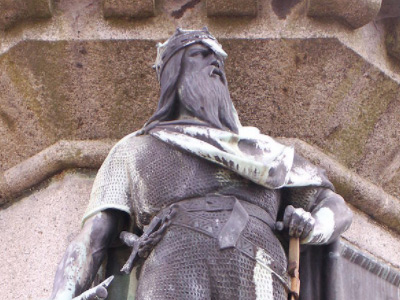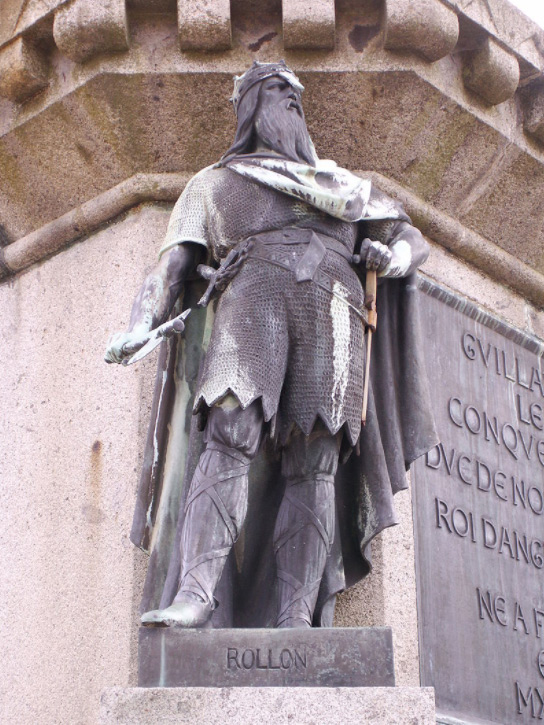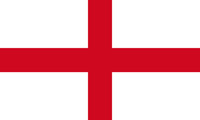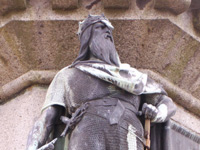Rollo (846-930 AD)

Rollo or Gaange Rolf; (Norman: Rou; Old Norse: Hrólfr; French: Rollon; c. 846 – c. 930 AD) was a Viking who became the first ruler of Normandy, a region of France. He is sometimes called the 1st Duke of Normandy. His Scandinavian name Rolf was extended to Gaange Rolf because he as an adult became too heavy for a horse to carry, therefore he had to walk ("gaa" in older Dano-Norwegian). Rollo emerged as the outstanding personality among the Norsemen who had secured a permanent foothold on Frankish soil in the valley of the lower Seine. Charles the Simple, the king of West Francia, ceded them lands between the mouth of the Seine and what is now the city of Rouen in exchange for Rollo agreeing to end his brigandage, and provide the Franks with protection against future Viking raids.

Rollo is first recorded as the leader of these Viking settlers in a charter of 918, and he continued to reign over the region of Normandy until at least 928. He was succeeded by his son, William Longsword in the Duchy of Normandy that he had founded. The offspring of Rollo and his followers became known as the Normans. After the Norman conquest of England The Kingdom of England was a sovereign state on the island of Great Britain from about 927, when it emerged from various Anglo-Saxon kingdoms, until 1 May 1707, when it united with Scotland to form the Kingdom of Great Britain. The Viking invasions of the 9th century upset the balance of power between the English kingdoms, and native Anglo-Saxon life in general. The English lands were unified in the 10th century in a reconquest completed by King Æthelstan in 927. and their conquest of southern Italy and Sicily over the following two centuries, their descendants came to rule Norman England (the House of Normandy), the Kingdom of Sicily (the Kings of Sicily) as well as the Principality of Antioch from the 10th to 12th century, leaving behind an enduring legacy in the historical developments of Europe and the Near East.
The Kingdom of England was a sovereign state on the island of Great Britain from about 927, when it emerged from various Anglo-Saxon kingdoms, until 1 May 1707, when it united with Scotland to form the Kingdom of Great Britain. The Viking invasions of the 9th century upset the balance of power between the English kingdoms, and native Anglo-Saxon life in general. The English lands were unified in the 10th century in a reconquest completed by King Æthelstan in 927. and their conquest of southern Italy and Sicily over the following two centuries, their descendants came to rule Norman England (the House of Normandy), the Kingdom of Sicily (the Kings of Sicily) as well as the Principality of Antioch from the 10th to 12th century, leaving behind an enduring legacy in the historical developments of Europe and the Near East.
Origins and Historiography
Rollo was born in the latter half of the 9th century; his place of birth is unknown.
The earliest well-attested historical event associated with Rollo is his leadership of Vikings who besieged Paris in 885–886.
Perhaps the earliest known source to mention Rollo's early life is the French chronicler Richer of Reims, who claims (in the 10th century) that Rollo was the son of a Viking named Ketill. In terms of onomastics, it is interesting that Richer also names – without explicitly linking him to Rollo – a man named Ketill as being the leader of subsequent Viking raids (in 888), against areas on the coast of West Francia, between the Seine and the Loire.
Medieval sources contradict each other regarding whether Rollo's family was Norwegian or Danish in origin. In part, this disparity may result from the indifferent and interchangeable usage in Europe, at the time, of terms such as "Vikings", "Northmen", "Danes", "Norwegians" and so on (in the Medieval Latin texts Dani vel Nortmanni means "Danes or Northmen").
A biography of Rollo, written by the cleric Dudo of Saint-Quentin in the late 10th Century, claimed that Rollo was from Denmark. One of Rollo's great-grandsons and a contemporary of Dudo was known as Robert the Dane. However, Dudo's Historia Normannorum (or Libri III de moribus et actis primorum Normanniae ducum) was commissioned by Rollo's grandson, Richard I of Normandy and – while Dudo likely had access to family members and/or other people with a living memory of Rollo – this fact must be weighed against the text's potential biases, as an official biography. According to Dudo, an unnamed king of Denmark was antagonistic to Rollo's family, including his father – an unnamed Danish nobleman – and Rollo's brother Gurim. Following the death of Rollo and Gurim's father, Gurim was killed and Rollo was forced to leave Denmark. Dudo appears to have been the main source for William of Jumièges (after 1066) and Orderic Vitalis (early 12th century), although both include additional details.
A Norwegian background for Rollo was first explicitly claimed by Goffredo Malaterra (Geoffrey Malaterra), an 11th-century Benedictine monk and historian, who wrote: "Rollo sailed boldly from Norway with his fleet to the Christian coast." Likewise, the 12th-century English historian William of Malmesbury stated that Rollo was "born of noble lineage among the Norwegians".
A chronicler named Benoît (probably Benoît de Sainte-More) wrote in the mid-12th Century Chronique des ducs de Normandie that Rollo had been born in a town named "Fasge". This has since been variously interpreted as referring to Faxe, in Sjælland (Denmark), Fauske, in Hålogaland (Norway), or perhaps a more obscure settlement that has since been abandoned or renamed. Benoît also repeated the claim that Rollo had been persecuted by a local ruler and had fled from there to "Scanza island", by which Benoît probably means Scania (Swedish Skåne). While Faxe was physically much closer to Scania, the mountainous scenery of "Fasge", described by Benoît, would seem to be more like Fauske.
The claim that Rollo was the brother of a King of Norway, Harald Finehair was made by an anonymous 12th-century Welsh author, in The Life of Gruffudd ap Cynan.
Rollo was first explicitly identified with Hrólf the Walker (Norse Göngu-Hrólfr; Danish Ganger-Hrólf) by the 13th-century Icelandic sagas, Heimskringla and Orkneyinga Saga. Hrólf the Walker was so named because he "was so big that no horse could carry him". The Icelandic sources claim that Hrólfr was born in Møre, western Norway, in the late 9th century and that his parents were the Norwegian jarl Rognvald Eysteinsson ("Rognvald the Wise") and a noblewoman from Møre named Hildr Hrólfsdóttir. However, these claims were made three centuries after the history commissioned by Rollo's own grandson.
There may be circumstantial evidence for kinship between Rollo and his historical contemporary, Ketill Flatnose, King of the Isles – a Norse realm centred on the Western Isles of Scotland. If, as Richer suggested, Rollo's father was also named Ketill and as Dudo suggested, Rollo had a brother named Gurim, such names are onomastic evidence for a family connection: Icelandic sources name Ketill Flatnose's father as Björn Grímsson, and "Grim" – the implied name of Ketill Flatnose's paternal grandfather – was likely cognate with Gurim. In addition, both Irish and Icelandic sources suggest that Rollo, as a young man, visited or lived in Scotland, where he had a daughter named Cadlinar (Kaðlín; Kathleen). Moreover, Ketill Flatnose's ancestors were said to have come from Møre – Rollo's ancestral home in the Icelandic sources. However, Ketill was a common name in Norse societies, as were names like Gurim and Grim. It is also possible that the later sources were attempting to suggest an otherwise undocumented link between the historical figures of Rollo and Ketill Flatnose, by way of little-known, possibly apocryphal figures like Grim, Gurim and the Ketill said to be Rollo's father.
Biography
Dudo tells us that Rollo seized Rouen in 876. He is supported by the contemporary chronicler Flodoard, who records that Robert of the Breton March waged a campaign against the Vikings, who nearly levelled Rouen and other settlements; eventually, he conceded "certain coastal provinces" to them.
According to Dudo, Rollo struck up a friendship in England with a king that Dudo calls Alstem. This has puzzled many historians, but recently the puzzle has been resolved by recognition that this refers to Guthrum, the Danish leader whom Alfred the Great baptised with the baptismal name Athelstan, and then recognised as king of the East Angles in 880.
Dudo records that when Rollo took Bayeux by force, he carried off with him the beautiful Popa or Poppa, a daughter of Berenger, Count of Rennes, took her in marriage and with her had their son and Rollo's heir, William Longsword.
There are few contemporary mentions of Rollo. The earliest record is from 918, in a charter of Charles III to an abbey, which referred to an earlier grant to "the Normans of the Seine", namely "Rollo and his associates" for "the protection of the kingdom." Dudo retrospectively stated that this pact took place in 911 at Saint-Clair-sur-Epte. In return for formal recognition of the lands he possessed, Rollo agreed to be baptised and assist the king in the defence of the realm. Rollo took the baptismal name Robert. The seal of agreement was to be marriage between Rollo and Gisla, daughter of Charles. Dudo claims that Gisla was a legitimate daughter of Charles. Since Charles first married in 907, that would mean that Gisla was at most 5 years old at the time of the treaty of 911 which offered her in marriage. It has therefore been speculated that she could have been an illegitimate daughter. However a diplomatic child betrothal need not be doubted.
After pledging his fealty to Charles III as part of the Treaty of Saint-Clair-sur-Epte, Rollo divided the lands between the rivers Epte and Risle among his chieftains, and settled with a de facto capital in Rouen.
Charles was overthrown by a revolt in 923, and his successor, Robert of Neustria, was killed by the Vikings in 923. His successor, Ralph, conceded the Bessin and Maine to Rollo shortly afterwards, the chronicler Flodoard tells us.
Rollo died sometime between a final mention of him by Flodoard in 928, and 933, the year in which a third grant of land, usually identified as being the Cotentin and Avranchin areas, was made to his son and successor William.
HISTORY

RESOURCES
This article uses material from the Wikipedia article "Rollo (846-930 AD)", which is released under the Creative Commons Attribution-Share-Alike License 3.0.
© Stories Preschool. All Rights Reserved.









